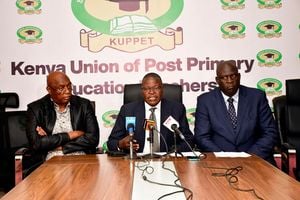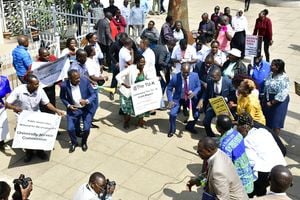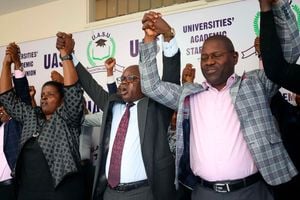
Cabinet Secretary for Education Julius Migos Ogamba.
Two major strikes by teaching staff and a suspended one by students, all in less than one month, paint the picture of a sector in turmoil.
To further illustrate the problems, Education Cabinet Secretary Julius Ogamba had a baptism of fire on Wednesday when he appeared before members of the National Assembly (for the first time since he took office) to answer questions on the status of the sector.
National Assembly Speaker Moses Wetang’ula captured the importance of discussing the state of education. He termed the debate “an extremely serious issue that affects you and the people you represent”, to chide some noisy MPs during the debate.
The last time Mr Ogamba had a date with MPs was during his vetting. The questioning on Wednesday coincided with the start of a nationwide strike by university lecturers and non-teaching staff.
Among other grievances, the lecturers want the government to sign with them a new collective bargaining agreement (CBA) to provide for better pay.
Mr Ogamba had to deal with questions about schools’ safety following the recent tragic fire incident at Hillside Endarasha Academy where 21 boys died when a dormitory caught fire. Two weeks later, no one has been held responsible for the deaths. The CS termed the incident “most unfortunate and regrettable”.
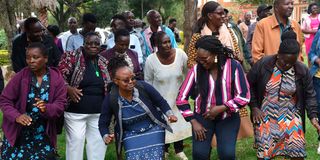
University of Eldoret Uasu members and members of Kenya University Staff Union Eldoret chapter during the launch of the nationwide strike at the institution on September 18, 2024.
Mr Ogamba revealed that this year, there have been 239 cases of unrest in secondary schools. Out of these, 106 have been fire incidences and 35 have occurred in the third term that only opened on August 26 .
“There’s been a problem with compliance [with safety guidelines] and we need to move policies to regulations so that there can be penalties for offenders,” he said.
The competency-based curriculum (CBC) has been a thorn in the flesh of other CSs who came before him since it was rolled out in 2019.
Former CS Amina Mohamed was transferred from the docket by ex-president Uhuru Kenyatta, soon after she declared that the country was not ready for its rollout.
Her successor, Prof George Magoha, pushed it through even as some stakeholders raised concerns over the curriculum. By the time he left office in 2022, one of the key issues about CBC was the domiciling of junior secondary schools.
The plan, at the time, was to transition the learners to secondary schools, and billions of shillings were used to improve infrastructure in the schools to prepare for the transition.
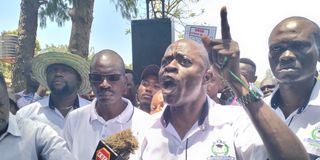
Chairman UASU Maseno Chapter Dr K'otuto George Ohuma speaks to the media at Maseno University on September 18, 2024.
However, this was one of the first things that President William Ruto reversed upon taking office. Following recommendations by the Presidential Working Party on Education Reforms (PWPER), a decision was made to domicile the segment in primary schools.
The term secondary was also dropped to only read — junior school.
Mr Ezekiel Machogu took over from Prof Magoha as Education CS and presided over what turned out to be a chaotic transition to Grade 7 in January 2023 and Grade 8 this year.
Learners in public junior schools remain without enough teachers, raising questions about their preparation for a shortened period of study in senior school (three years). Almost all public primary schools lack science laboratories.
Earlier on Wednesday, MPs had noted that 32, 469 classrooms and laboratories needed to be built in primary schools to accommodate the 1.5 million learners who will join Grade 9 in January.
And the 46,000 teachers on contract deployed in junior school are forced to teach subjects they did not train for, therefore, unqualified. It is these teachers who have been clamouring for employment on permanent terms.

A student studies inside an empty lecture hall at the Technical University of Kenya on September 18, 2024.
The government has promised to recruit 20,000 more. The figure falls way below the promise by President Ruto when he was campaigning before the 2022 General Election that he would employ 116,000 teachers within two years to fix staffing gaps in schools. He’s now been office for two years.
The promise to reform university education has also been far from smooth. The funding model for higher education introduced last year has faced opposition from both students and their families as the model will leave students with huge loans upon graduation.
The model was the cause of the suspended strike by university students. Dr Ruto this week appointed a 129-committee to review the model. However, its composition has already been challenged even before it begins work. The committee has two months to work and then submit a report.
Mr Ogamba told the MPs that 124,364 students had been placed in various universities but, 14,174 were yet to report. He explained that the number falls within previous trends as some join private universities or other tertiary institutions of training.
The CS said that 75,000 students have already paid their household contributions while 12,000 students have since lodged appeals for funding and that the portal would remain open until December 2024.
With the Kenya Certificate of Secondary Education (KCSE) examinations scheduled to begin on October 22, secondary school teachers have made fresh demands for increased allowances to officiate the crucial examinations.
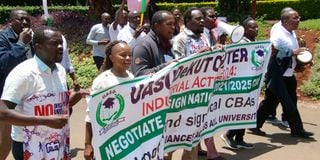
Lecturers from Dedan Kimathi University and members of Kenya University Staff Union demonstrate outside the institution in Nyeri on September 18, 2024,
Despite the CS announcing that the State had launched an inspection of all schools to assess their compliance to the safety standards manual, some of the principals told Nation that they are yet to see any inspectors in their schools. However, education stakeholders want him to address the elephant in the room — congestion in schools.
“We heard what the CS said, but is he aware of the state of our schools in terms of congestion? What has he done since he took over the ministry? Has he ever visited the highly populated national and extra county schools and seen the sleeping arrangement?” Asked a chief principal.
For their part, parents led by the National Parents Association chairman Silas Obuhatsa urged the CS to address the unrest in schools. He said learning has been paralysed in several schools causing anxiety among parents.
“In the recent case at Dadachabasa Mixed Day Secondary School, parents took action due to lack of water. The school located at the periphery of the Cherab Sub-County bordering Wajir County has been experiencing a water shortage, affecting basic hygiene, sanitation, and the well-being of students and staff,” said Mr Obuhatsa.
In the past month, Dadachabasa has faced a severe water shortage after the only borehole providing water to the village broke down and the dam that provided water for people and livestock dried up,” he said.


